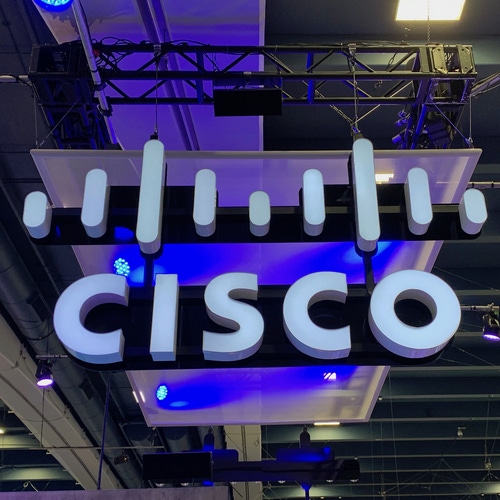Cisco CEO Robbins: Global Jitters Drive Down Tech Spending
Service providers' declines were matched by a global spending pause as Cisco reported disappointing results for its most recent quarter.

Cisco saw sluggish growth in its most recent quarter, reported Wednesday, with double-digit declines in the service provider sector joined by slowdowns among enterprise and SMB customers.
CEO Chuck Robbins said tech spending worldwide is slowing down due to a litany of global uncertainty, including Hong Kong unrest, China-US tensions and more.
Total Cisco revenue for the first quarter ending October 28 was $13.159 billion, up 2% year-over-year; with non-GAAP net income of $3.6 billion, up 5% year-over-year; or $0.84 per share, up 12%, according to a Cisco statement.
For the second quarter, Cisco forecast revenue down 3% to 5% year-over-year, with non-GAAP earnings per share at $0.75 to $0.77.
Service provider revenue was down 13% year-over-year, a continuation of recent quarters. But this time was different: The enterprise sector was also down by 5%, and the commercial sector -- Cisco's name for the small and midsized enterprises with 1,000 employees or less -- was down by 5%. Of Cisco's four major customer segments, only the public sector was up; it grew by 6%.
Now entering its sixth year, the 2020 Vision Executive Summit is an exclusive meeting of global service provider executives focused on navigating the disruptive forces at work in telecom today. Join us in Vienna on December 3-5 to meet with fellow senior communications executives as we define the future of next-gen communications and how to make it profitable.
On a conference call with financial analysts, Cisco CEO Chuck Robbins was resolute, pointing several times to the "macro environment" -- the economy as a whole, worldwide -- as a major contributor to slowed spending by customers. However, the nature of contemporary business means customers will have to start spending sooner rather than later, and when they do, they'll remain loyal to Cisco, Robbins said.
"For customers, it feels like there's not a broad-based loud noise out there. It feels like there's a bit of a pause," Robbins said. Factors leading to the slowdown include big deals that were downsized. Customers also changed approval processes, indicating more careful scrutiny of expenditures.
China continued its decline, down 31%, with the momentum of the decline continuing to accelerate, Cisco said.
Still getting feet wet with 5G
As in previous quarterly calls, Cisco said the service provider market slowdown is attributable to the current state of SPs building out trials for consumer-based 5G services, which they'll run mostly over existing networks.
When service providers turn to enterprises, they'll have to engineer backbones for higher throughput and traffic, requiring increased investment in networking equipment, which they'll turn to Cisco for, Robbins said. He expects to see that in the second half of 2020.
And Robbins sees technology transitions in the headlights that will create demand: WiFi 6, 400 Gbit/s speeds and the 5G transition eventually, Robbins said.
By product category
The company's main engine, its infrastructure platforms, which include the switches and routers on which it's built its business for decades, saw $7.538 billion revenue, down 1%. Services were up 4%, to $3.281 billion. Applications were up 6%, to $1.499 billion; security up 22%, to $815 million; and other products down 20%, to $26 million.
Cisco touted its multi-year transition to a subscription software revenue model as one of its greatest strengths. Subscriptions comprised 71% of software revenue, up 12 points year-over-year.
It's a scary world out there
Robbins pointed to global uncertainty leading to reduced confidence, which translates to reduced spending. "If you just go around the world right now, you look at what's happening in Hong Kong, with the China-US trade situation, what's going on in DC, you've got Brexit, you've got uncertainty in Latin America. Any of those that are big issues, if they get resolved, then you could see some of the uncertainty removed," Robbins said.
"Business confidence just suffers when there's lack of clarity. There's been lack of clarity for so long, that I think it finally just came into play," Robbins said. And US elections are coming next year, which leads to further uncertainty.
However, Robbins said, the company is "in good shape" for the long term.
"Customers will pause for a while, but technology is so absolutely core to their fundamental strategies that the time that they are going to be able to pause is going to be shorter than what you've seen the past," Robbins said. "They're worried about competitor investment; they're worried about falling behind."
Cisco is not alone among network equipment vendors reporting disappointing results.
Juniper last month reported overall revenues falling 4% to $1.13 billion year-over-year and the service provider business, accounting for 40% of sales, down 17%. On an earnings call with analysts, CEO Rami Rahim said service providers are reprioritizing investments to address spectrum and radio access network (RAN) buildout first, with less to spend on Internet protocol. Like Cisco, Juniper sees 5G as ultimately forcing operators to invest in core and edge networks, where Juniper has strength.
Likewise, Arista warned of "sudden softening" in demand on its earnings call this month, pointing to a single "cloud titan" as the culprit, strongly hinting that it was Facebook. Arista's stock took a hit despite an otherwise strong quarter.
Meanwhile, Nokia has its own set of problems, struggling with an engineering choice it made about 5G chips in early 2016 that is coming back to bite Nokia now.
And, echoing Robbins' comments about customers pausing on spending, both AT&T and Verizon are stingy on capex.
Related:
— Mitch Wagner ![]()
![]()
![]()
![]() Executive Editor, Light Reading
Executive Editor, Light Reading
Read more about:
EuropeAbout the Author(s)
You May Also Like




_International_Software_Products.jpeg?width=300&auto=webp&quality=80&disable=upscale)







